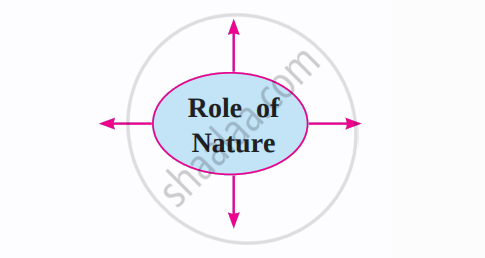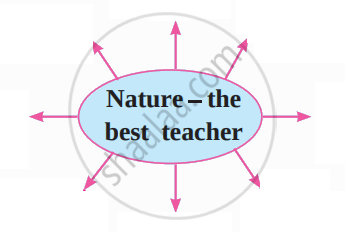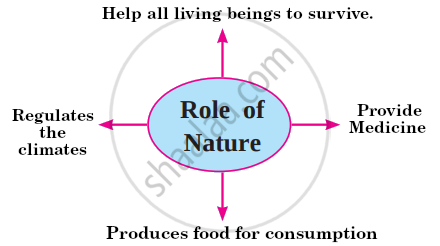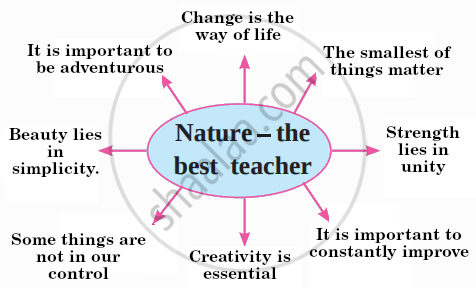Advertisements
Advertisements
Question
Role of Nature: Discuss in pairs, the role played by nature and complete the web diagram.


Solution
 |
 |
APPEARS IN
RELATED QUESTIONS
Read the following passage and do the activities.
We have a hibiscus plant in our garden. Every fortnight a flower blooms on it - big, bright and tender. Through the day it smiles with the sun and dances with the wind, but as evening approaches, it starts wilting. The morning after, it withers completely and by evening it falls and becomes one with the earth again. The flower comes to life only for a day, yet it does so in full splendour. What if we too lived our life, however short, to its fullest?
We went to a rocky beach and saw the spread of the majestic ocean and the rocks alongside, carved, sculpted and shaped by the water. Water is so gentle, rock so hard, yet, as the water flows over it every day, for years, the rock gives in. It takes the shape that the water commands. Our problems are so colossal and we are so small, yet if we persist...
We saw small bits of grass peeping through the small cracks in a concrete pavement. It left us thinking: however impossible things may look, there is always an opening...
We saw a tree bare of all leaves in the cold winter months. We thought its chapter was over. But three months passed, spring set in and the tree was back to its green majesty once again, full of leaves, flowers, birds and life. What if we too had the conviction that, however difficult things are right now, it will not remain so for ever. Remember, this too shall pass.
(A1) Rewrite the following sentences in proper sequence. 02
(a) It starts wilting.
(b) Through the day, it smiles with the sun.
(c) It withers completely.
(d) Every fortnight a flower blooms.
(A2) Complete the following sentences. 02
(1) Our problems are ……………………….. .
(2) However impossible things may look ………………………………………..
(A3) Match the columns. 02
| A | B |
| (1) Drying and drooping | (a) Conviction |
| (2) Huge, massive | (b) Splendour |
| (3) Grandeur | (c) Colossal |
| (4) Firm belief | (d) Wilting |
(A4) (1) Do as directed. 02
(a) We went to the rocky beach and saw the spread of the majestic ocean. (Begin with ‘After going to….’)
(b) We have a hibiscus plant in our garden. (Write a question to which the underlined word is the answer).
(A5) What role does nature play in our lives? 02
Various aspects of Nature have special features that make them differ from one another.
For example, Birds:- appearance, shape, colour, size, food habits, habitat, sound etc.
Write such special features of each of the following.
- Land- _______________
- Water- ______________
- Trees- _______________
- Animals- ____________
- Insects- _____________
What things in nature teach us the following:
Nothing is impossible to achieve ____________.
What things in nature teach us the following:
Problems are not permanent ___________.
What things in nature teach us the following:
Make the best use of time and opportunity__________.
What things in nature teach us the following:
Be persistent ____________.
What things in nature teach us the following:
Many hands make work light ____________.
What things in nature teach us the following:
Delicate structures are not a sign of weakness ______.
Read the question from the lesson. What do they imply?
What if we too had lived our lives, however short, to the fullest?
Read the question from the lesson. What do they imply?
What if we too are consistent, organized, focused...?
Go through the lesson again and complete the flow-chart that highlights the life of a ‘hibiscus’ flower.

The writer explains the contrasting features of ‘water’ and ‘rock’ in the lesson. Write all the features of both water and rock in the given table.
| Water | Rock |
| 1. | 1. |
| 2. | 2. |
| 3. | 3. |
| 4. | 4. |
The writer bas very positively described the different things in nature. Discuss with your partner the special features of coach one of them. Add on the list.
| Part of Nature | Special feature | Value learnt |
| 1. Rainbow | ||
| 2. Caterpillar | ||
| 3. | ||
| 4. | ||
| 5. | ||
| 6. | ||
| 7. |
Think and answer in your own words.
‘An oyster turns a grain of sand into a pearl.’ What can we learn from this example?
Think and answer in your own words.
How does nature succeed in its ‘Alchemy’? What can it turn a small person into?
Think and answer in your own words.
Which two aspects of nature teach us to accept change and adjust according to the situation?
Think and answer in your own words.
Why does the writer begin by quoting the lines from William Blake's poem 'Auguries of Innocence'?
Prepare a Fact file of any of the following plants/trees, using the points given.
[coconut / neem / basil / cactus / apple]
- Name of Plant/Tree _________
- Scientific name ___________
- Region and climate ___________
- Features ___________
- Growth _____________
- Size, shape and colour ____________
- Uses __________
- Any special feature ________
Look at the following thing. Discuss with your friend, what you learn from them.
A bee
Look at the following thing. Discuss with your friend, what you learn from them.
An eagle
Look at the following thing. Discuss with your friend, what you learn from them.
A creeper
Look at the following things. Discuss with your friend, what you learn from them.
The river
Look at the following things. Discuss with your friend, what you learn from them.
Rainfall
Look at the following things. Discuss with your friend, what you learn from them.
Sun
The writer explains the contrasting features of ‘water’ and ‘rock’ in the text. Write all the features of both water and rock in the given table.
| Water | Rock |
| 1. | 1. |
| 2. | 2. |
| 3. | 3. |
| 4. | 4. |
Go through the text again and complete the web that highlights the various features of flower of the ‘hibiscus’ plant. One is done for you.

The author has very positively described the different things in nature. Discuss with your partner the special features of each one of them. Add on the list.
| Part of Nature | Special Feature | Value Learnt |
| 1. Water | ||
| 2. Rainbow | ||
| 3. Caterpillar | ||
| 4. | ||
| 5. | ||
| 6. | ||
| 7. | ||
| 8. | ||
| 9. | ||
| 10. |
